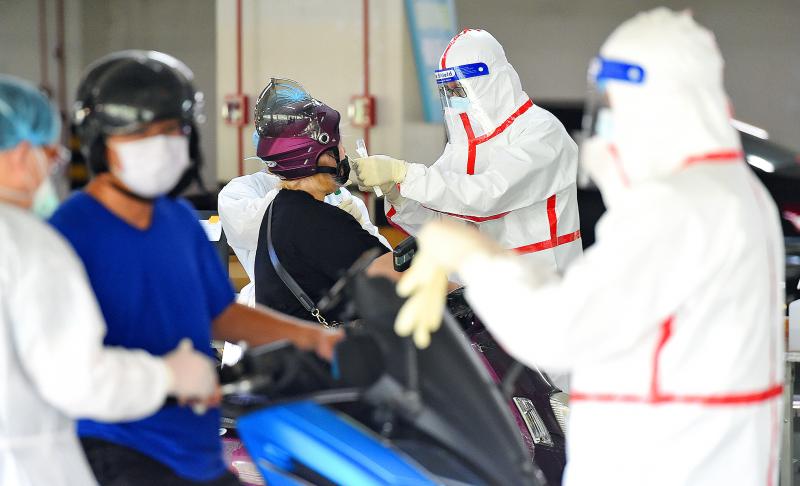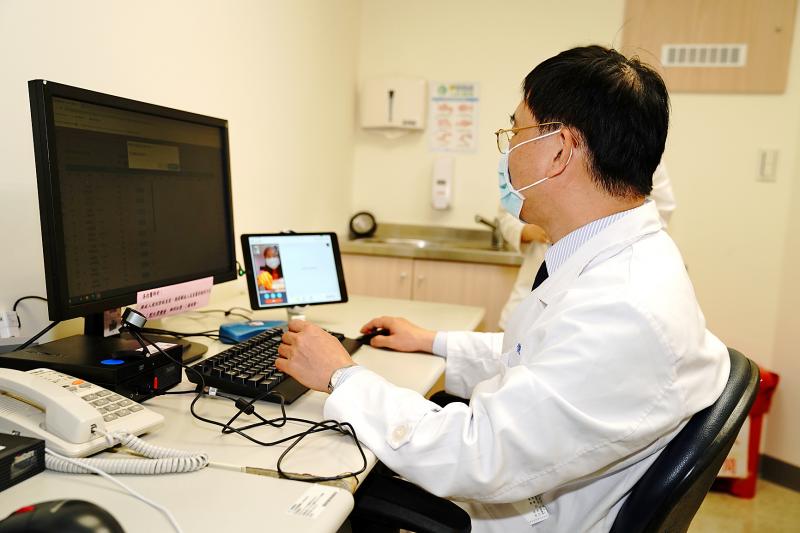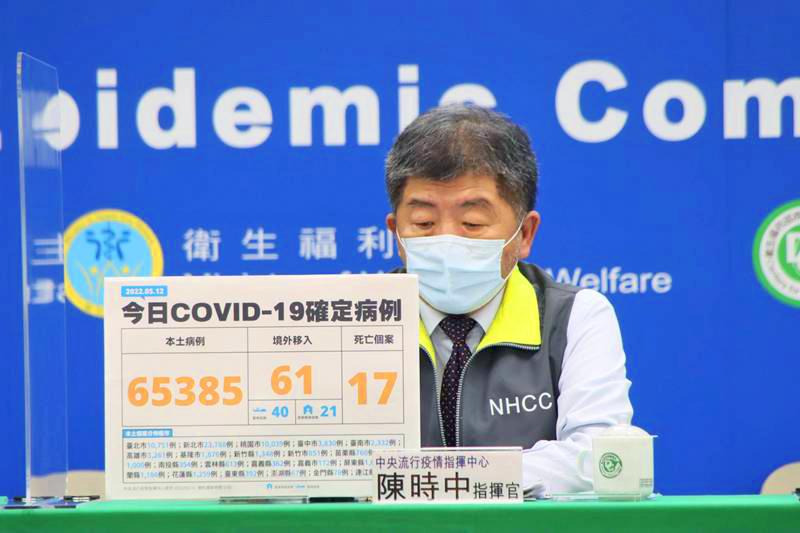Starting today, people with COVID-19 can send a family member or friend to a doctor on their behalf to obtain the oral antiviral drug Paxlovid, or any other medication if determined apporpiriate, the Central Epidemic Command Center (CECC) said yesterday.
Centers for Disease Control Deputy Director-General Philip Lo (羅一鈞), deputy head of the CECC’s medical response division, said the policy was created to allow patients with risk of developing severe symptoms to receive therapeutic medication in a timely manner.
Cases who qualify for Paxlovid, an oral antiviral drug for treating COVID-19, can ask a family member or friend who is not in quarantine or home isolation to visit a doctor to consult on their behalf, he said.

Photo: Liao Chen-huei, Taipei Times
The person should bring the National Health Insurance (NHI) card of the patient in question, along with evidence of a positive COVID-19 test, such as a digital COVID-19 certificate or a screenshot of the test-result page from the NHI app, he said.
If Paxlovid is prescribed, a person can take the prescription to one of 124 hospitals in Taiwan that carry the medication, Lo said.
Also starting yesterday, people in three-day home isolation, four-day self-health management or seven-day home quarantine who test positive for COVID-19 using a rapid antigen test can have their results officially confirmed in a virtual consultation with a physician.

Photo courtesy of Shinkong Wu Ho-su Memorial Hospital
Previously, a polymerase chain reaction (PCR) test at a hospital was required to confirm the positive diagnosis.
Minister of Health and Welfare Chen Shih-chung (陳時中), who heads the CECC, said yesterday that the new policy applies to rapid test kits that use nasal swabs, as well as saliva-based test kits that have been granted emergency use authorization by the Food and Drug Administration.
The policy does not apply to rapid test kits that were obtained abroad, as they are not approved by the government, he added.

Photo courtesy of the CECC
Separately yesterday, the Ministry of Health and Welfare said that the local COVID-19 outbreak has not yet reached its peak, and that severe cases and deaths are expected to rise as the virus is spreading widely in communities.
Centers for Disease Control Director-General Chou Jih-haw (周志浩), who also heads the CECC’s disease surveillance division, made the remarks at a weekly Cabinet meeting yesterday.
From Thursday last week to Wednesday, domestic COVID-19 cases rose by 302,754, a significant increase from 124,403 cases over the previous seven days, Chou said.
Imported cases this week were down 51 percent from the previous week, from 921 cases to 454, he said.
Among the 421,703 domestic cases this year, 894 cases had medium to severe symptoms, with 98 deaths, while 99.79 percent of the cases reported mild or no symptoms, he said.
The ministry is focusing on maintaining effective functioning of the medical system and reducing severe symptomatic cases and deaths.
The nation’s single-day COVID-19 cases exceeded 60,000 for the first time yesterday, with 65,446 new cases and 17 deaths, the CECC said, adding that 61 were imported.
The 17 people who died of COVID-19 were aged from their 60s to 90s. Fifteen had underlying medical conditions, including cardiovascular disease, diabetes, chronic kidney disease, stroke or cancer, CECC data showed.
Six of the cases had not received COVID-19 vaccination, while the others had one or more doses, the data showed.
The CECC also said that 61 people had developed moderate symptoms and 18 had developed severe symptoms.
New Taipei City yesterday reported the highest number of domestic cases — 23,788 — followed by Taipei with 10,751, Taoyuan with 10,039, Taichung with 3,830 and Kaohsiung with 3,261.
Tainan reported 2,332 cases, Keelung 1,876, Hsinchu County 1,348, Hualien County 1,259, Yilan County 1,186, Pingtung County 1,061, Changhua County 1,000, Hsinchu City 851, Miaoli County 760, Yunlin County 613, Taitung County 392, Chiayi County 362, Nantou County 354 and Chiayi City 172.
Kinmen County reported 78 cases, Penghu County 67 and the Matsu Islands five.

INFRASTRUCTURE: Work on the second segment, from Kaohsiung to Pingtung, is expected to begin in 2028 and be completed by 2039, the railway bureau said Planned high-speed rail (HSR) extensions would blanket Taiwan proper in four 90-minute commute blocs to facilitate regional economic and livelihood integration, Railway Bureau Deputy Director-General Yang Cheng-chun (楊正君) said in an interview published yesterday. A project to extend the high-speed rail from Zuoying Station in Kaohsiung to Pingtung County’s Lioukuaicuo Township (六塊厝) is the first part of the bureau’s greater plan to expand rail coverage, he told the Liberty Times (sister paper of the Taipei Times). The bureau’s long-term plan is to build a loop to circle Taiwan proper that would consist of four sections running from Taipei to Hualien, Hualien to

A relatively large earthquake may strike within the next two weeks, following a magnitude 5.2 temblor that shook Taitung County this morning, the Central Weather Administration (CWA) said. An earthquake struck at 8:18am today 10.2km west of Taitung County Hall in Taitung City at a relatively shallow depth of 6.5km, CWA data showed. The largest intensity of 4 was felt in Taitung and Pingtung counties, which received an alert notice, while areas north of Taichung did not feel any shaking, the CWA said. The earthquake was the result of the collision between the Philippine Plate and the Eurasian Plate, the agency said, adding

Snow fell in the mountainous areas of northern, central and eastern Taiwan in the early hours of yesterday, as cold air currents moved south. In the northern municipality of Taoyuan, snow started falling at about 6am in Fusing District (復興), district head Su Tso-hsi (蘇佐璽) said. By 10am, Lalashan National Forest Recreation Area, as well as Hualing (華陵), Sanguang (三光) and Gaoyi (高義) boroughs had seen snowfall, Su said. In central Taiwan, Shei-Pa National Park in Miaoli County and Hehuanshan National Forest Recreation Area in Nantou County saw snowfall of 5cm and 6cm respectively, by 10am, staff at the parks said. It began snowing

The 2025 Kaohsiung Wonderland–Winter Amusement Park event has teamed up with the Japanese manga series Chiikawa this year for its opening at Love River Bay yesterday, attracting more than 10,000 visitors, the city government said. Following the success of the “2024 Kaohsiung Wonderland” collaboration with a giant inflatable yellow duck installation designed by Dutch artist Florentijn Hofman, this year the Kaohsiung Tourism Bureau collaborated with Chiikawa by Japanese illustrator Nagano to present two giant inflatable characters. Two inflatable floats — the main character, Chiikwa, a white bear-like creature with round ears, and Hachiware, a white cat with a blue-tipped tail